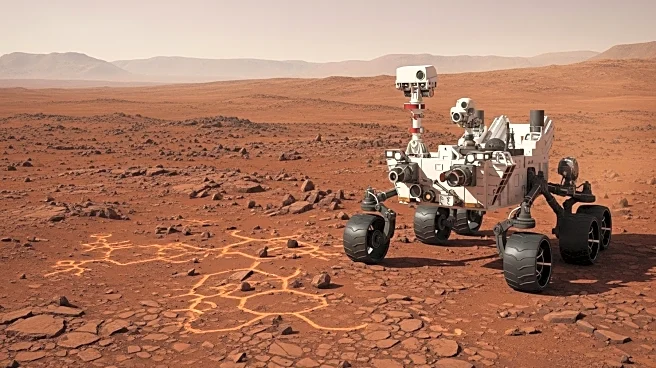What's Happening?
NASA's Perseverance rover has made a significant discovery on Mars, uncovering mysterious markings rich in chemicals essential for life. The rover explored the Neretva Vallis, a valley that once fed an ancient Martian lake, and found an arrowhead-shaped rock called Cheyava Falls. The rock's surface was speckled with black 'poppy seeds' and faint 'leopard spots,' which were found to contain organic carbon, iron, phosphorus, and sulfur. These elements are crucial for sustaining life, and the presence of rare minerals vivianite and greigite suggests redox reactions, similar to those that support life on Earth. This discovery reignites hopes that Mars may have once harbored complex chemistry conducive to life.
Why It's Important?
The discovery of redox chemistry on Mars is significant as it fuels the debate about the potential for life on the planet. Redox reactions are fundamental to life processes on Earth, such as photosynthesis and respiration. The presence of these reactions on Mars suggests that similar processes could have supported life there. This finding contributes to the broader scientific understanding of Mars' history and its potential to host life, impacting future exploration missions and research priorities. The discovery also highlights the importance of continued investment in space exploration and the search for extraterrestrial life.
What's Next?
NASA's Perseverance rover will continue to explore the Martian surface, seeking further evidence of life-supporting chemistry. The findings may influence future missions to Mars, focusing on areas with potential for past or present life. Scientists will analyze the data to understand the implications for Mars' habitability and the possibility of life beyond Earth. The discovery may also prompt discussions on the ethical considerations of exploring and potentially colonizing Mars.
Beyond the Headlines
The discovery raises questions about the ethical implications of space exploration and the search for extraterrestrial life. As scientists uncover more evidence of life-supporting conditions on Mars, discussions about the potential for human colonization and the preservation of Martian ecosystems may intensify. The findings also contribute to the cultural fascination with Mars and the broader quest to understand humanity's place in the universe.











